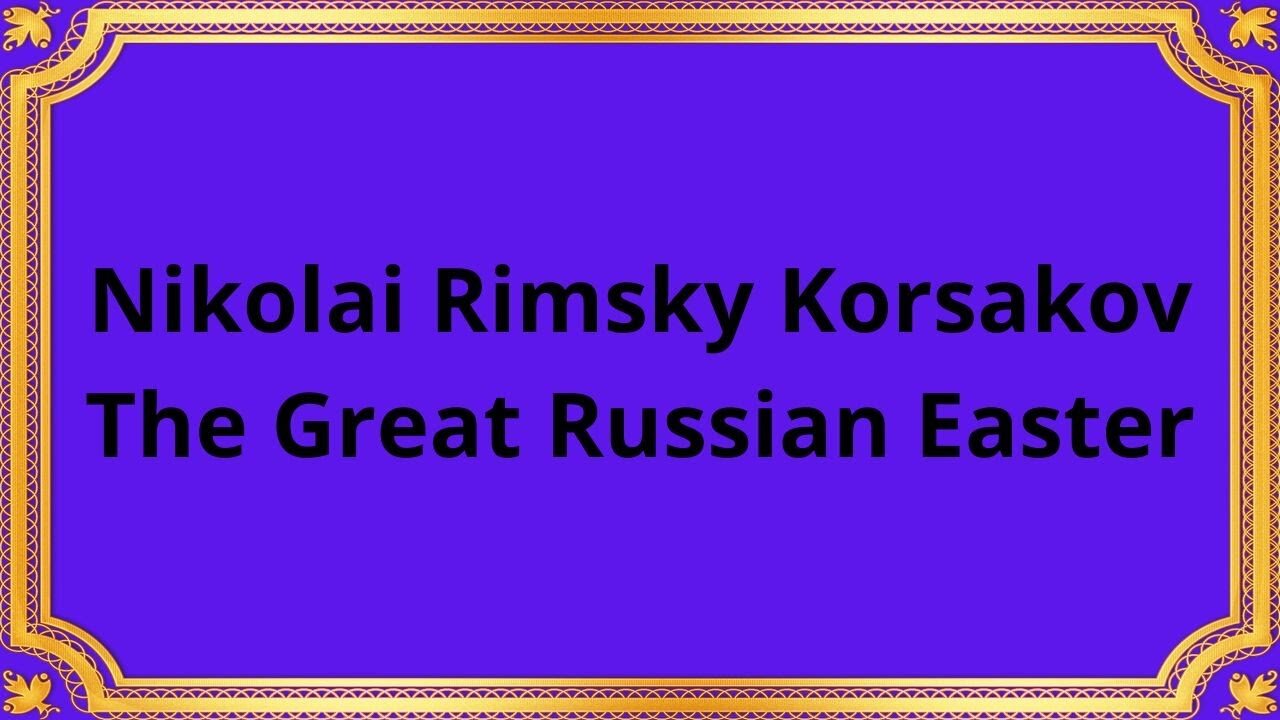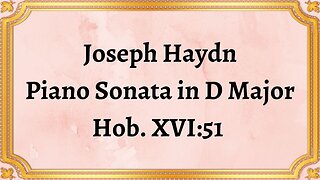Premium Only Content

Nikolai Rimsky Korsakov The Great Russian Easter
#RimskyKorsakov #ClassicalMusic #GreatRussianEaster #MusicComposition #RussianMusic #RussianComposers #OrchestralMusic #SymphonicPoem #MusicHistory #19thCenturyMusic #RussianFolklore #RussianClassicalCompositions #MusicAnalysis #RimskyKorsakovLegacy
Orchester national de l'O.R.T.F., conductor: Charles Munch
Nikolai Rimsky-Korsakov's "The Great Russian Easter" is a captivating musical composition that showcases the richness and vibrancy of Russian culture. Composed during the late 19th century, this orchestral work, also known as the "Russian Easter Overture," transports listeners to the heart of Russian folklore, incorporating elements of traditional melodies, rhythmic patterns, and vibrant orchestrations.
Composed in 1888, "The Great Russian Easter" was inspired by the composer's deep appreciation for Russian traditions and customs. Rimsky-Korsakov sought to capture the essence of the Russian Easter holiday, a time of celebration and spiritual significance in Russian Orthodox Christianity. By infusing traditional melodies and incorporating folk elements, he aimed to create a musical work that honored his cultural heritage while showcasing his compositional skill.
"The Great Russian Easter" is a symphonic poem that follows a loose narrative structure, evoking the spirit and atmosphere of the Russian Easter celebration. The composition begins with a solemn and mystic introduction, representing the religious significance of the holiday. As the music progresses, it transitions into a lively and exuberant section, symbolizing the joyous nature of the festivities. Rimsky-Korsakov skillfully weaves together contrasting moods and musical themes, creating a dynamic and engaging musical journey.
Rimsky-Korsakov's "The Great Russian Easter" holds immense cultural significance as it represents a musical celebration of Russian identity and folklore. The composition incorporates Russian melodies and motifs, drawing from the rich tapestry of Russian folk music. By infusing these elements into a symphonic work, Rimsky-Korsakov pays homage to the cultural heritage of his homeland, creating a sense of national pride and appreciation.
The orchestration in "The Great Russian Easter" is particularly noteworthy, as Rimsky-Korsakov's masterful use of instruments creates vivid and evocative musical landscapes. The composition showcases his genius for colorful and imaginative orchestrations, with the various sections of the orchestra depicting different aspects of the Russian Easter celebration. From the resounding brass fanfares to the delicate strings and woodwinds, Rimsky-Korsakov's orchestration creates a rich sonic tapestry that immerses the listener in the vibrant world of Russian culture.
Nikolai Rimsky-Korsakov's "The Great Russian Easter" is a musical masterpiece that pays homage to the rich cultural heritage of Russia. Through the blending of traditional melodies, rhythmic patterns, and exquisite orchestrations, Rimsky-Korsakov captures the spirit of the Russian Easter celebration, transporting listeners to a world of joy, spirituality, and cultural pride. "The Great Russian Easter" stands as a testament to Rimsky-Korsakov's compositional genius and his enduring legacy in the realm of classical music. It serves as a celebration of Russian culture, inviting audiences to experience the beauty and richness of Russian traditions through the power of music.
You have the opportunity to support the channel:
https://destream.net/live/RadSiarAl/donate
https://www.buymeacoffee.com/6355radsiaral
-
 6:07
6:07
Classical music_Music Inspiration
1 month agoJoseph Haydn Piano Sonata in D Major, Hob. XVI:51
881 -
 1:00:20
1:00:20
The Tom Renz Show
1 day agoTrump Schools Zelensky, The Epstein Files FAIL, & What RFK Will Mean for Cancer
80.9K22 -
 42:47
42:47
Kimberly Guilfoyle
16 hours agoThe Trump effect: More Major Investment, Plus America First at Home & Abroad. Live w/Ned Ryun & Brett Tolman | Ep. 201
155K40 -
 1:29:23
1:29:23
Redacted News
15 hours agoWW3 ALERT! Europe pushes for war against Russia as Trump pushes peace and cutting off Zelensky
186K305 -
 57:56
57:56
Candace Show Podcast
19 hours agoHarvey Speaks: The Project Runway Production | Ep 1
174K108 -
 56:31
56:31
LFA TV
1 day agoEurope’s Relationship With America Is Over | TRUMPET DAILY 3.3.25 7PM
56.4K11 -
 2:04:45
2:04:45
Quite Frankly
16 hours ago"European Deth Pact, Blackout Data Breach, Epstein" ft. Jason Bermas 3/3/25
54.9K24 -
 1:32:46
1:32:46
2 MIKES LIVE
13 hours ago2 MIKES LIVE #187 Deep Dive Monday!
31.8K1 -
 44:25
44:25
CatfishedOnline
15 hours ago $2.28 earnedRacist Lady Shocked After Sending Money to a Nigeria Romance Scammer
38.4K6 -
 56:45
56:45
VSiNLive
14 hours agoFollow the Money with Mitch Moss & Pauly Howard | Hour 1
58K1